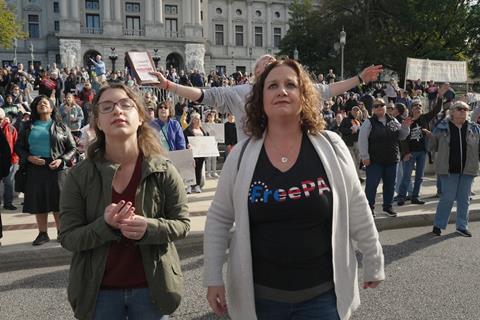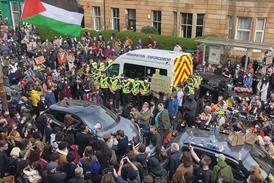Timely documentary tracks small-town school board elections in Pennsylvania

Dir: Auberi Edler. France. 2024. 118mins
Auberi Edler’s timely documentary follows a local school board election in the Pennsylvania borough of Elizabethtown, where the dominant local Republican party has been taken over by the Christian far-right – a faction reflected in the board candidate it endorses. Premiering at IDFA, this is a prescient story that many will read today as a cinematic synecdoche. As went this small town in October 2023, so went the nation in November 2024.
Urgent, absorbing documentary
Edler is an experienced documentary director who has also worked as a TV news anchor, war correspondent and New York bureau chief for two leading French broadcast networks. Here she takes a back seat, building her story through the deft editing of what is clearly months of patient observational footage. In this, An American Pastoral recalls the approach of Frederick Wiseman, an American director who is revered in Edler’s native France. What Edler adds to the Wiseman playbook is a journalist’s instinct for the perfect quote, the killer scene.
Hardly a second too long despite its almost two-hour running time, this urgent, absorbing documentary should be required viewing for those, inside or outside the United States, who are struggling to make sense of the recent presidential election. It will also speak to anyone interested in the battle over books and gender issues that has been raging for some time now in the American educational sector.
Acting here as both director and cameraperson, Edler has a real eye for this community where smalltown America and its farmlands meet. There’s irony in some of her framings – like the sad fake herons that survey a lawn in front of a house – but there’s a bemused affection, too. It’s clear that for both the Republican and Democrat candidates who are standing for the five available places on the Elizabethtown school board – in an election that could give the far-right control over the school – this is a town worth fighting for.
Siegfried Canto’s gentle, guitar-led soundtrack is used sparingly, mostly to accompany a series of poetic bridging sequences shot from a moving car, but it underlines the double-edged ‘pastoral’ title of a film that is never less than cinematic. This is a film about pastoral America, but also an America whose ownership is being claimed by Christian nationalist pastors like the one – complete with cassock and dog collar – who suggests to an appreciative audience at a summer gathering that school board members who try to “shove their mentally ill tranny freakshow down the throats of our children” should be “crushed like vermin”.
A succession of such fly-on-the-wall scenes track the two rival groups of candidates as they meet to plan their campaigns, canvas for votes, go to meetings inside and outside the school, attend church and put in an appearance at the local cattle fair. ”I want to keep working for change, but… can we really do this?” says an emotional audience member when she is handed the microphone during a powerful sequence in a church hall meeting. Scenes set inside Elizabethtown’s high school include a meeting group for gay and transgender students whose safe space, not to mention safety, may no longer be guaranteed when the board that runs the place is under new management.
Among the characters that emerge from the flow are an eternally hopeful Democratic board candidate, who has tried and failed to get elected before, and a Republican who records Christian motivational videos from her car dashboard on her way to work – videos that always end with a plug both for Jesus and her favourite appetite-suppressing microbiome drink.
Edler’s outsider’s perspective adds weight to her intelligent, probing documentary. The film shows that these two political sides, with their utterly incompatible belief systems, are mostly indistinguishable. One of the film’s most telling moments comes when the camera sits in on a meeting of four well-coiffed ladies in a stuffy, prim living room. Even when one mentions the name of their group – the ‘Freedom Readers’ – we’re not quite sure which side they are on, so factional is the use of the word ‘freedom’ in today’s United States. The truth soon emerges, but that momentary uncertainty speaks volumes about what it’s like to live in a country where other people can be both so familiar and so alien.
Production companies: Arte France, Les Films d’Ici Mediterranee, Les Films d’Ici
International sales: Mediawan Rights
Producer: Serge Lalou
Cinematography: Auberi Edler
Editing: Barbara Bascou
Music: Siegfried Canto






















